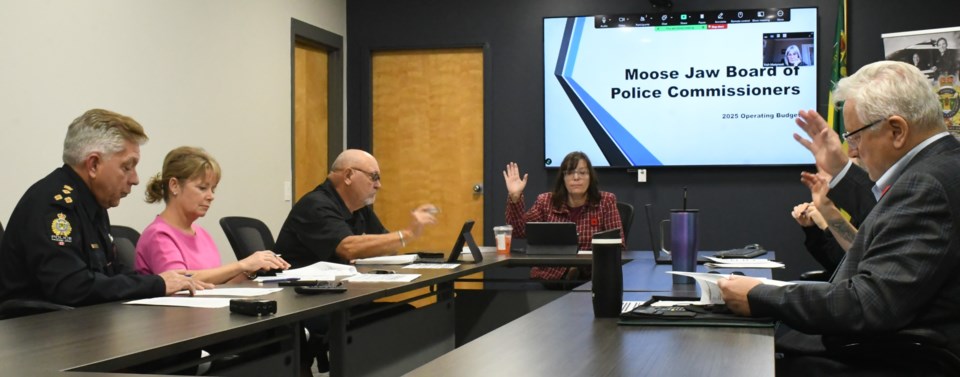MOOSE JAW — The province is forcing the Moose Jaw Police Service to pay nearly $232,000 to fund the provincial 911 service, which is adding to its 2025 budget and angering the police board chairwoman.
During a special Board of Police Commissioners’ meeting on Nov. 7 to discuss the MJPS’s proposed 2025 budget, chairwoman Crystal Froese expressed disappointment that Moose Jaw had to pay $231,800 next year to fund the provincial emergency service, which represents a two-per-cent increase to the police budget.
“Everybody has a cell phone and we all pay a fee … for the 911 service. And that should be paying for this 911 service,” she said. “But instead, the province is keeping that money and downloading that cost onto us … . And I just don’t think that’s acceptable.”
Police Chief Rick Bourassa has been working to acquire an answer about this issue, but because the province has not responded, the police service had to include that expense in its budget, which is unfair, Froese continued. The province should not be downloading this cost onto communities.
“I am frustrated, as you can tell,” she added with a chuckle.
Bourassa said his conversations with the province were paused because of the election in October. However, with the election over, he plans to contact the new minister of policing and corrections — Moose Jaw North MLA Tim McLeod — and the deputy minister.
“I’m hopeful that that funding will not go through the police budget … (and) hopefully it won’t be our responsibility to pay for that,” he said.
There is still time for the province to remove this cost, while the police service has not yet presented its proposed budget to city council, said Froese. The $231,800 is a significant amount that could be reallocated to other areas.
Meanwhile, she highlighted some positives things about the police service, such as its Victim Services’ Branch and the eight new officers hitting the streets next year.
The MJPS will send three new members to the Saskatchewan Police College in January and six in the summer. Its full authorized strength is 72 members, but that number is currently under 60 because of retirements and departures.
“We do have a very robust recruiting strategy … . (But) we have to be competitive in how we recruit because we have to highlight everything Moose Jaw has to offer” and show how it’s a great place for families and to start a career, said Froese.
Furthermore, the police service must highlight its modernization of technology and equipment since “everybody wants to work at a place with the best toys and the best tools,” she added.
Commissioner Clive Tolley said he wasn’t pleased with the proposed 7.43-per-cent increase request since it was too high for his liking. However, the new council can review the proposed budget and decide to either receive it or send it back for revisions.
Meanwhile, he thought it was imperative that the police board submit this document to city administration quickly so it can work the proposed percentage increase into the overall budget document.
Capital budget
With the capital budget proposals, Deputy Chief Rick Johns said the agency estimated the costs for each project. For example, the $50,000 allocation for the elevator replacement — expected to cost $250,000 — ensures the organization has money available for the future upgrade.
Furthermore, the agency will spend $10,000 to upgrade a rifle training range it is renting in a rural area by installing safety berms.
Moreover, $149,000 will turn the second-floor classroom into office space for the new officers and members of the joint MJPS-RCMP crime reduction team.
Also, $40,000 will upgrade the detention centre with new bio-metric sensors to monitor prisoners and create better sightlines so officers can see everyone.
Furthermore, $10,000 will replace a sidewalk adjacent to the building where members park their vehicles.
Lastly, the $85,000 for “unanticipated infrastructure demands” will help modernize the MJPS building since it’s nearly 40 years old.
Bourassa said that if the agency experienced a major infrastructure problem — a broken air conditioner, for example — and didn’t have the money to fix it, it would approach the police board and have it ask council for funding.




